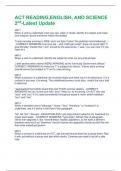ACT READING,ENGLISH, AND SCIENCE
2nd-Latest Update
skill 1
When a verb is underlined, trust your ear. when in doubt, identify it's subject and make
sure singular/ plural and tense match the subject
"it was monday morning in 2006, and I am Kyle Tucker" the politician and intellectual ,...
- CORRECT ANSWERS-trust your ear ...and I AM kyle tucker" does not sound right "it
was Monday" implies that "i am" should be the past tense, "i was." you can hear it if you
listen to it
skill 2
When a verb is underlined, identify the subject & cross out any prep phrase
I, with several other interns WERE ARRIVING at the "bermuda Government offices" -
CORRECT ANSWERS-It's tricky but "i" is subject not interns. "interns were arriving"
sounds correct but subject is "I" so it's i was arriving
skill 3
When a pronoun is underlined, we must be totally sure what noun it is referring to. If it is
unclear in any way, it is wrong. The underlined pronoun must also , match the noun that
it refers too
I approached the bulletin board that held YOUR summer destiny - CORRECT
ANSWERS-we can not be sure who "your" refers to, so it's wrong. On ACT only use
"your" and "you" if it is used consistently throughout essay & never switch between
"you" and "one"
skill 4
When a transition word ("although," "since," "but," "therefore," or "however") is
underlined, see if it works in the flow of the paragraph
"No, No, No!" i thought . NEVERTHELESS i got angry-blood rushed to my head and my
knees went weak. - CORRECT ANSWERS-"I got angry" follows flow of paragraph,
rather than opposes it. But "nevertheless" implies opposition, so we want a different
transition word such as "therefore" and all choices are opposition words so pick the one
that omits underlined portion
skill 5
When a comma is underlined on ACT, ask yourself should there be a pause there. Rad
it with and without a pause and see which works. Commas are used to set off a side
note
, Not ME, THE BUDDING POLITICIAN, AN assistant to the assistant to the assistant -
CORRECT ANSWERS-try with and without pauses. With pauses it sounds clear, and
without pauses it sounds confusing and jumbled "the budding politician" is a side note
inessential to meaning of sentence , so we need commas
skill 6
Phrases that can stand alone are separated with a semicolon, comma with "and," or a
period
I found my DEPARTMENT, AND I WAS immediately given a list of mundane tasks -
CORRECT ANSWERS-"i found my department" and "i was immediately.." are both
complete thoughts that can stand alone; they are independent. Therefore, they must be
separated by a semicolon, comma with "and,"nor a period ( colons separate a list or a
clause that explains)
skill 7
When a prepositional is underlined, ask yourself if it is the right preposition to use
I was young, but I understood every aspect in the GOVERNMENT. - CORRECT
ANSWERS-" but i understood every aspect in the government" sounds weird. The
aspects are literally not in the government ; they are aspects of the government. "Every
aspect of the government" sounds correct. Trust your ear
skill 8
If "I" or "me" is underlined, test it by putting the I/me first or drop the other person and
trust your ear. if "its" or "it's" is underlined, remember that "it's" mean "it is" and "its" is
possessive like "that tree is nice; i like its colorful leaves
At some point before midday, i began thinking seriously about quitting "the assistant's
office, its right downstairs," i thought - CORRECT ANSWERS-"The assistants office" is
not complete it can not stand alone. So it must have a comma instead of a semicolon.
Second "its" is possessive but we want the contraction of "it is"
skill 9
"my uncle's books" means one uncle has books, and " my uncles' books" means two or
more uncles have books. Watch for needed "ly". "who" is for people and "which" is for
things
i saw both of my MOM'S AND HEARD BOTH OF MY UNCLES' laughter - CORRECT
ANSWERS-since there are two uncles. "uncles' laughter" is correct. "Mom's is also
correct. So theres no error
skill 10
ACT likes crisp and clear, we always want the answer that is most clear, concise, direct,
and nonredundent




